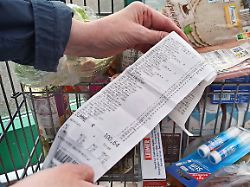Traffic light decisions as drivers
Consumers will probably be asked to pay more in 2024
December 20, 2023, 4:16 p.m
Listen to article
This audio version was artificially generated. More info | Send feedback
Inflation will subside at the end of the year, but the traffic light government’s decisions are likely to cause an increase again. Consumers bear the costs twice as many companies want to raise prices at the beginning of the year.
Germans’ purchasing mood improved significantly at the end of the year – but experts are pouring water on the wine again for the coming months. According to findings from the economic research institute IFO, the decline in inflation is likely to stall. The Munich researchers said the proportion of companies in Germany that wanted to raise their prices in the coming months was increasing again.
The IFO barometer for company price expectations climbed to 19.7 points in December, from 18.1 points in November. “This means that the decline in inflation rates is likely to stall for the time being,” said IFO economics chief Timo Wollmershäuser.
Innkeepers in particular want to noticeably increase their prices: here the barometer shot up to 87.6 points in December, after 45.9 points in the previous month. The mood in the catering industry is currently in the basement, as the VAT on food, which was reduced as a result of the Corona crisis and rising energy prices due to the Russian attack on Ukraine, will expire in January. Then 19 percent instead of 7 percent will be due again.
The desire to buy increases at the end of the year
According to a consumer study by the market research company GfK and the Nuremberg Institute NIM, both expectations regarding income and the inclination to make larger purchases improved noticeably at the turn of the year. In their forecast for January, the two institutes see the consumer climate at -25.1 points. This means an increase of 2.5 points compared to the previous month. However, the consumer climate before the pandemic was around +10 points.
The experts expressed concerns about further developments. “It remains to be seen whether the current increase is the beginning of a sustainable recovery in consumer sentiment,” said NIM expert Rolf Bürkl. “Consumers are still very worried.” Geopolitical crises and wars, sharply rising food prices and discussions about the federal budget caused uncertainty. “Consequently, the level of consumer sentiment is currently still extremely low.”
The concerns are supported by a survey by the consulting firm AlixPartners. According to this, around 35 percent of Germans want to spend less money on consumption in the coming year. This affects spending on everyday products such as food, but also areas such as electronics, leisure items or hardware store products as well as entertainment and gastronomy. The consultants surveyed 10,000 consumers in seven countries in October and November, including 2,000 in Germany. The most important support for the slight improvement at the end of the year is the income expectation. People could hope for higher wages and salaries.
Economists also see inflation rising at the beginning of the year as a result of the federal government’s decisions to support the 2024 budget with a higher CO2 price, plastic levy and increasing tax on airline tickets. “All in all, the inflation rate in January is likely to be just under four percent,” according to a study by Commerzbank. In November it fell to 3.2 percent, the lowest level in around two and a half years. An increase to 3.7 percent is already expected for December due to a special effect, as the state had taken over the one-off monthly advance payments for gas and district heating a year earlier.
